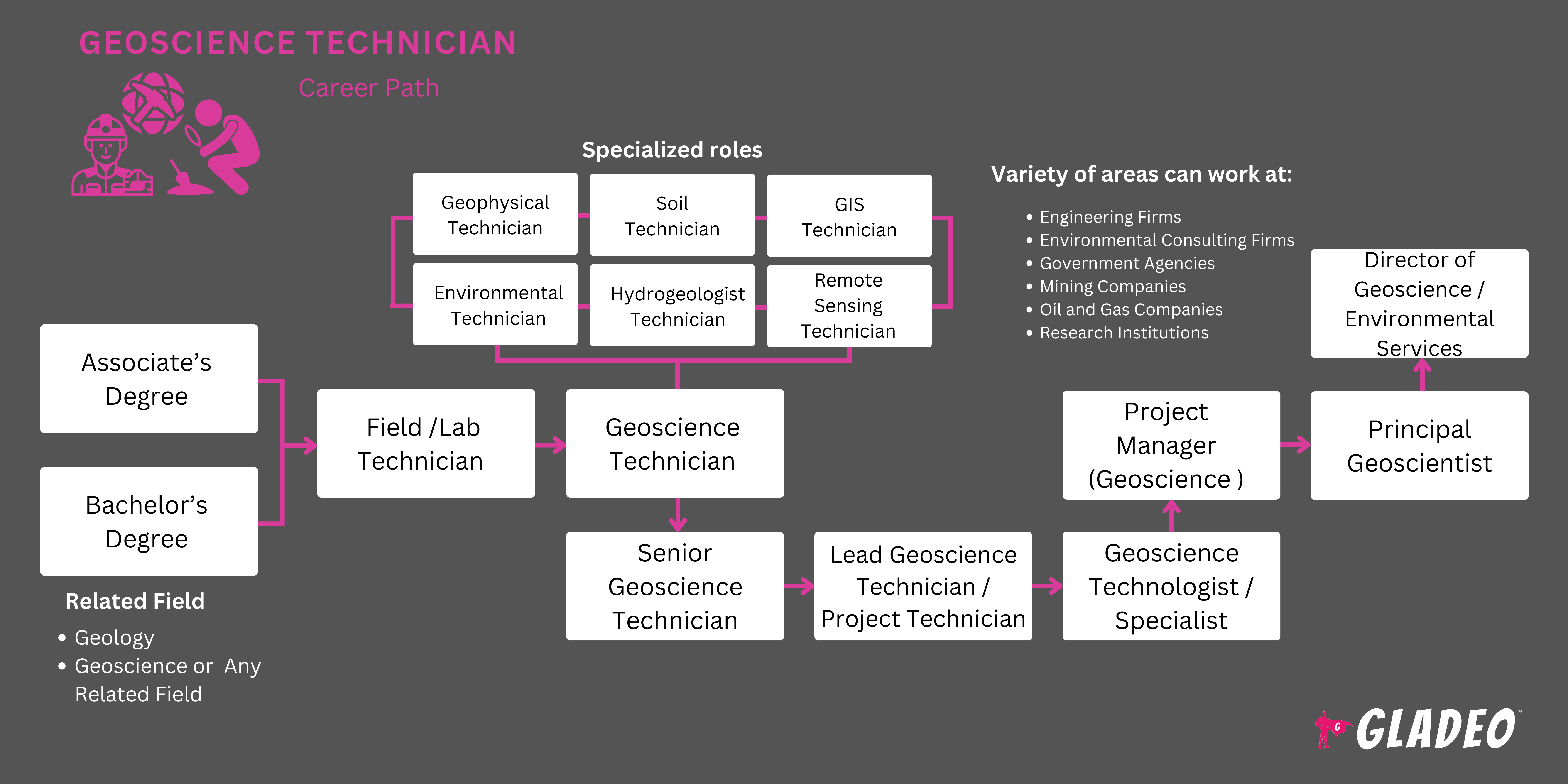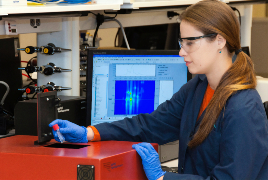聚光灯
岩心检查员、环境现场服务技术员、环境采样技术员、地质电子记录仪操作员、地质技术员、地球科学技术员、地质技术员、材料技术员、物理科学技术员、土壤技术员、地质助理、岩心取样员、实验室技术员——地球科学、地球科学技术员
在我们脚下,地球蕴藏着秘密——那些 隐藏的岩层、矿物和化石,诉说着 我们星球的过往,也塑造着能源、建筑和环境保护的未来。地球科学技术员就像地球的侦探!他们协助地质学家、水文学家和工程师采集、记录并分析来自地面、海洋甚至冰川的样本。
他们是地球科学团队中亲力亲为的成员——从钻探现场采集岩心样本,绘制野外位置图,在实验室准备样品,并将精准数据输入强大的软件系统。无论是识别有价值的矿藏、检查施工现场的稳定性,还是监测环境污染,他们的工作都为土地利用、能源开发和可持续发展等重大决策提供支撑。
这是一份适合热爱户外工作且痴迷科学的人士的职业。今天或许要跋涉崎岖地形采集土壤和水样;明天则可能在实验室里仔细检测并整理数据,这些数据将成为科学家和行业领袖的重要依据。
- 探索关于地球运作机制的新发现,并见证你的研究成果对实际项目产生影响。
- 工作地点多样——从安静的实验室到山脉、森林、沙漠或海上钻井平台。
- 支持保护环境、引导负责任资源利用的科学研究。
- 成为团队中的一员,在这里,你的现场和实验室技能受到重视,并能产生切实的影响。
工作日程
- 地球科学技术人员通常全职工作,具体工作时间因项目而异。野外工作可能需要清晨出发、夜间出行或在偏远地区延长工作时长。实验室工作通常遵循标准工作日,但在繁忙时期,因项目截止日期和研究目标要求,工作时间可能延长。
典型职责
- 从野外地点采集岩石、土壤、水和沉积物样本。
- 操作钻探、取芯和勘测设备。
- 准确记录并标记样本以供实验室分析。
- 将数据输入地理信息系统(GIS)或制图软件。
- 协助准备地图、图表和技术报告。
额外职责
- 校准和维护现场及实验室设备,以确保结果准确。
- 协助资深地质学家解读岩心样本、地震读数或土壤测试数据。
- 与施工或采矿团队协调,安排安全的现场通行时间。
- 开展环境监测以检测水质变化、侵蚀或污染情况。
- 参加安全简报会并遵守严格的环境法规。
清晨时分,一辆满载野外装备的卡车驶出——车上装载着GPS设备、样品袋和安全头盔。技术人员前往即将修建新道路或管线的工地。他们的任务?采集并标记地表以下的土壤和岩层样本,以确定地基是否足够稳固,适合进行施工。
午后时分,他们回到实验室,着手清理和分析样本。借助显微镜、计算机和专业仪器,他们协助整理数据,这些数据将成为工程师安全设计的重要依据。有些日子他们全程在野外度过——无论天气如何,都在徒步跋涉、钻探取样或进行测量。而另一些日子则是在安静的实验室轮班中度过,用于标本归档和实验检测。
我的日常工作是办公室事务与野外作业的平衡。大量时间用于整理、分析地质样本,并借助软件工具解读数据。但最精彩的部分无疑是踏入野外——与钻井工协作、检查岩心样本、观察含水层的动态。这份工作既充满成就感又要求严苛,需要注重细节、解决问题、团队协作,并适应从实验室到偏远野外站点等各种严苛环境。 ——莎拉·罗伯茨,地球科学技术员
软技能
- 观察
- 注重细节
- 沟通
- 团队合作
- 批判性与分析性思维
- 问题解决
- 适应性
- 组织与记录保存
- 野外工作的体力耐力
- 安全意识与责任
技术技能
- 样本采集与制备
- 钻探、取芯及GPS设备的操作
- 地理信息系统与制图软件
- 实验室检测程序
- 环境监测技术
- 数据录入与分析
- 对地质术语的理解
- 设备维护与校准
- 现场技术员:大部分时间在户外采集样本。
- 实验室技术员:专注于样本分析与数据整理。
- 岩土工程技术员:从事建筑与工程项目的工作。
- 环境技术员:监测土壤、水和空气质量,确保合规性并促进资源保护。
- 工程与环境咨询公司
- 采矿、石油和天然气勘探公司
- 政府机构(地质调查、水资源、环境保护)
- 大学和研究实验室
- 建筑与基础设施公司
这不是一份仅限于办公室的工作。地球科学技术人员常需在户外恶劣天气下作业,有时远离家乡。野外作业地点可能尘土飞扬、泥泞不堪或地处偏远。工作时间可能较长,你需要习惯佩戴安全装备并严格遵守操作规程。
取舍何在?你将接触真实数据,探访鲜为人至的秘境,并为塑造社区、守护环境的重大科研与基础设施项目贡献力量。
科技正在重塑地球科学领域。如今,技术人员运用无人机、先进的GIS制图技术、三维建模及自动化传感器,以更快的速度采集更精准的数据。环境可持续性已成为核心关注点,技术人员在监测土壤健康、地下水安全及土地修复方面发挥着关键作用。地热能与风能等绿色能源项目正为该领域创造全新机遇。
许多人热爱徒步、露营、探索自然,或收集岩石与化石。另一些人则热衷于科学展览、建造项目或地理社团。对地球运作原理的好奇心——以及不惧脏手的勇气——往往始于幼年时期。
- 大多数地球科学技术员职位要求至少拥有副学士学位,或完成两年应用科学或相关技术领域的专科教育。社区学院或技术学院常开设相关课程,专业方向涵盖地球科学、石油技术或地球科学领域。
- 约79%的职位招聘更倾向于拥有学士学位的候选人,而某些研究或学术岗位可能要求硕士学位或更高学历。
- 相关课程通常包括地质学、数学、化学、物理学和计算机科学,并鼓励学生积累实验室和野外实践经验。
- 在职培训较为普遍,新入职的技术人员通常在监督下,通过操作现场和实验室设备以及建模与制图软件来积累实践经验。
- 来自美国石油地质学家协会等专业协会的专项认证,能够提升职业前景并彰显专业能力。
- 职业发展取决于教育背景、工作表现和技能水平,有时会晋升为管理或专业岗位。
- 这些教育途径为成功从事地球科学技术员职业提供了必要的技术基础和实践技能。
- 在高中阶段尽可能多选修数学和科学课程,包括化学、物理、生物学,以及如果开设的话,尤其要选修地球科学或地质学。
- 选修高级课程,如大学先修课程(AP)或国际文凭课程(IB),以做好学业准备,并可能获得大学学分。
- 参加课外活动,如科学社团、环保社团或户外社团,以培养相关兴趣和技能。
- 寻求基于工作的学习机会,例如工作见习、实习或实地考察,将课堂学习与现实世界中的地质工作相联系。
- 通过英语、写作和演讲课程培养沟通能力,这些能力对于实地报告和团队合作至关重要。
- 在大学期间,攻读地质学、地质技术或地球科学的副学士学位或学士学位,重点学习地质学、数学、计算机科学及实验室技能。
- 寻找研究或实习机会,以获得实地考察、实验室技术和地质软件的实践经验。
- 加入专业组织和地质俱乐部,拓展人脉并深入了解该领域。
- 记录学术和实践经历以充实简历,并寻求地球科学领域的导师指导。
- 实地考察与实践性实验室环节,而不仅仅是课堂学习。
- 获取现代地理信息系统(GIS)和制图技术。
- 与地质或环境机构的实习或合作教育机会。
- 强大的行业资源助力就业安置。
全国各地的社区学院、技术学校和大学都设有优质课程。

- 具备适当教育背景(通常为地质或石油技术领域的副学士学位或文凭)与实践经验的地球科学技术人员,通常能较轻松地找到工作。
- 若缺乏现场或实验室经验,可考虑通过实习或 入门级技术岗位来积累相关技能。
- 许多人最初以地质或石油技术员实习生或助理的身份入职,随后晋升为正式技术员。
- 熟悉地质术语、数据采集方法、制图软件以及野外作业中常见的安全规程。
- 在领英及其他职业社交平台创建专业档案,以便与行业专业人士和雇主建立联系。
- 定期浏览Indeed、Glassdoor等招聘门户网站以及专业矿业或能源招聘平台,寻找相关职位空缺。
- 在简历中突出任何可量化的成就、实习经历、证书(例如急救、H2S Alive)以及软件操作能力。
- 与教授、前任主管及实习导师保持联系,请求他们提供推荐信或允许将他们列为推荐人。
- 研究潜在雇主,了解其项目、地理重点和技术。
- 在面试中,展现对地质行业趋势、安全标准及团队协作能力的认知。
- 遵守专业面试礼仪,包括穿着得体并准备好应对常见的技术人员面试问题。
- 在地理信息系统(GIS)、测绘、实验室分析或环境监测等专业领域获得高级认证,以提升技术专长。
- 承担专业化角色,深化在岩土工程勘察、环境数据采集或水文地质学方面的技能。
- 建立准确可靠的实地数据采集、实验室分析及报告编制的良好声誉,这对职业发展至关重要。
- 通过展现领导力、沟通能力和项目管理技能,晋升为高级技术员、项目协调员或现场团队负责人职位。
- 攻读地质学、环境科学或相关领域的学士学位或更高学历,以获得担任管理、研究或专业职位的资格。
- 寻求管理小型项目或协调实地工作的机会,以积累领导力和决策经验。
- 加入美国地球科学研究所等专业组织或地区性地质学会,以拓展人脉、获取培训资源并发掘职业发展机遇。
- 及时掌握与地球科学相关的新技术、法规和行业趋势,以提升自身价值。
- 考虑获取专业执照,例如专业地质科学家(PG)认证,以拓展职业选择,尤其在咨询和公共部门职位方面。
- 探索向地质工程或环境咨询等相关领域横向转岗的机会,以拓宽您的职业发展路径。
网站
- 美国地质调查局(USGS)
- 国家公园管理局——地质与地球科学
- 美国地质学会
- 美国地球科学研究所
- 确实
- 领英
- Glassdoor
- 环境职业网
- 土方工程职位 - earthworks-jobs.com
- 地球科学就业中心(美国地质学会)
- 美国地质学会招聘信息板
书籍
- 《地质学精要》作者 :斯蒂芬·马沙克
- 《实用地统计学》作者:伊索贝尔·克拉克与威廉·哈珀
- 《地球:物理地质学导论》塔巴克与卢特根斯著
成为一名地球科学技术员需要奉献精神和专业技能。对于希望探索更多职业选择的人士,以下是根据行业和劳动力资源提供的可考虑发展路径:
- 环境科学技术员
- 测绘技术员
- 水文技术员
- GIS专家
- 建筑材料测试仪
- 公园护林员或自然资源技术员
新闻源

精选职位

在线课程与工具








